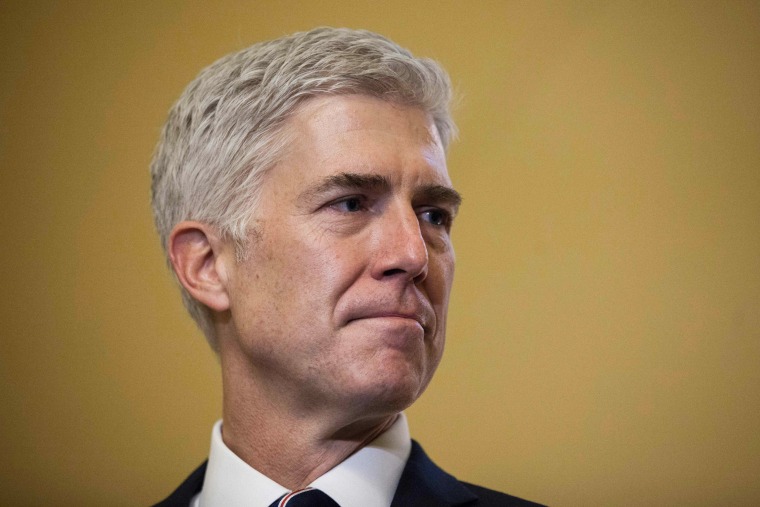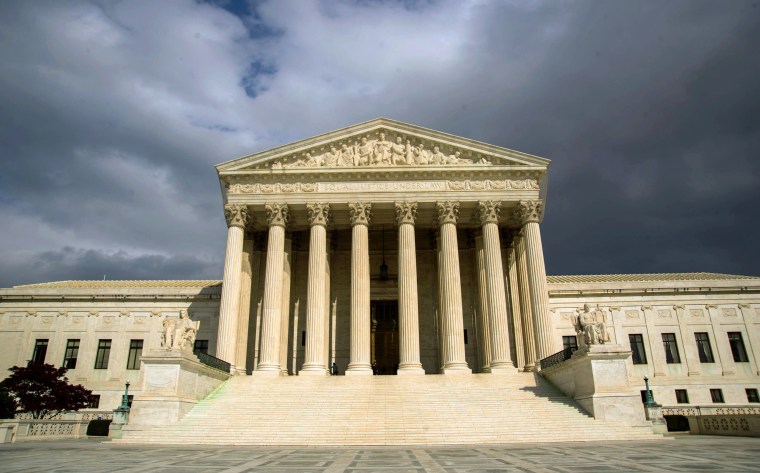Since President Donald Trump announced his pick for the Supreme Court last week, lawmakers, journalists and the public have been learning about Neil Gorsuch.
Among them, Latino legal experts are closely following the nomination process of Gorsuch, 49, a member of the 10th U.S. Circuit Court of Appeals. They point to Gorsuch's record and issues that may come before the high court as areas of concern.
Latinos account for about 1 in 6 Americans and 1 in 4 public school students. These numbers mean that a nominee like Gorsuch — who could serve for decades, because Supreme Court justices serve lifetime appointments — would rule on cases that increasingly affect the Latino community.
Thomas A. Saenz, president and general counsel of the Mexican American Legal and Educational Defense Fund (MALDEF), told NBC News that Gorsuch's nomination raises questions that deserve thoughtful and careful review.
"Gorsuch is coming into this process with two strikes against him. One, he is potentially coming into a seat that should have gone to Obama's nominee, Merrick Garland, except the Senate abandoned its duty to provide advice and consent," Saenz said. "Two, his nomination follows a week of action by the Trump administration displaying hostility to immigrants, Latinos and the Constitution."
Several representatives of Latino advocacy groups echoed Saenz's contention that Gorsuch is slated for a Supreme Court vacancy that they believe was rightfully President Barack Obama's to fill.
Saenz also warned of a "a rushed, superficial confirmation process for Gorsuch, as we saw for some of Trump's Cabinet nominees."
Saenz noted that Gorsuch currently sits in the 10th Circuit, which includes New Mexico, Colorado and Utah — states with significant Latino populations. "Yet we have not seen any strong indicators that he is familiar with our community," Saenz said.
Some of the cases likely to come before the Supreme Court in the near future would involve voter ID laws, redistricting, immigration enforcement, reproductive rights and racial bias in policing. Just weeks into his administration, Trump's restrictions on travel by refugees and visitors from seven Middle East countries seems almost sure to wind up at the court, as well.
"On many levels, this nomination has to be looked at carefully," said Juan Cartagena, president and general counsel of Latino Justice PRLDEF, "and what we know so far is not good."
Gorsuch sees himself as an "originalist," in the vein of the late Justice Antonin Scalia, Cartagena said.
"So he sees the Constitution as a set of principles that does not evolve," Cartagena said. "An originalist basically tries to put himself in the shoes of a group of all-male, all-white gentlemen back in the day and then rule as he feels they would."
An originalist approach to the law generally — but not always — leads to conservative results. The philosophy is worrisome to civil rights advocates, as Latinos and other minorities have historically turned to the Supreme Court to guarantee equal protection under the law.
Scalia, whom Gorsuch admires, was a reliable opponent of the expansion of civil rights for members of minority groups.
"So where does that leave us?" Cartegena asked. "Under Gorsuch's line of thinking, the court would not get involved in contemporary issues. They would just defer to the legislative branch. This is devoid of reality."
Gorsuch is a graduate of Columbia University and Harvard Law School. He was nominated to the 10th Circuit by President George W. Bush in 2006. If confirmed, he would become the 113th justice of the Supreme Court.
Gorsuch is seen by liberals as favoring corporations over workers and as a potential foe of women's reproductive rights.
Last year, he dissented in a case that found that a trucking company improperly fired an employee because he was a whistleblower. In 2013, he sided with Hobby Lobby Stores Inc. when it sought to limit their employees' access to contraception under the Affordable Care Act.
However, conservative groups see him as pro-business and a defender of religious liberty.
In fact, conservative Latino groups have hailed Gorsuch's nomination. Daniel Garza of the Libre Initiative released a statement calling Gorsuch an "excellent, competent candidate" who "will interpret the law and the Constitution faithfully."
Mario H. Lopez, president of the Hispanic Leadership Fund, said that his group supported Gorsuch's nomination and would urge senators to confirm him.

"Latinos should support Gorsuch for the same reason anyone else does: Because he is loyal to the Constitution," Lopez said. "We don't want someone putting their personal views in place of what the Constitution says, including the First, Second, Fourth and 14th amendment[s]."
According to Lopez, Supreme Court justices should be "like umpires, calling balls and strikes, instead of making up rules and substituting their judgments for what the Constitution says."
Lopez said "church-going Latinos" want to be able to practice their religion without government interference, adding: "Religious liberty is a huge issue."
Asked about that view, Saenz of MALDEF said: "I don't know what that means. Any Supreme Court justice would protect religious liberty. I don't know if that is code for allowing people to be discriminated against, in which case it is not a valid point of view."
"I don't think the Latino community, with limited exceptions, has any interest in using religion as an excuse to discriminate," Saenz added. "That is not a view I know to be widely held in the Latino community."
Maria Blanco, executive director of the University of California Undocumented Legal Services Center, told NBC News that Gorsuch's record fits with his originalist view of the law.
"But in my work for many years with civil rights, immigrant rights and LGBT rights, there is always concern with an originalist judicial philosophy," she said.
Blanco believes that many landmark cases, on everything from abortion to education to marriage equality, would have had a different outcome under such a view.
"We would not have all the rights we take for granted today if the court only looked at original intent," she said. "And in immigration cases, when people [judges] only look at their version of the letter of the law, to the exclusion of its broader intent and its spirit, that can be a problem."
In his time on the bench, Gorsuch has handled only a few prominent immigration cases, and he has ruled both for and against immigrants.
In Montano-Vega v. Holder (2013), he was sympathetic to an undocumented immigrant facing deportation. In Porro v. Barnes (2010), he found that the constitutional rights of a federal immigration detainee were not violated when he was restrained and Tasered several times in an Oklahoma jail.
In another case involving an undocumented immigrant, Gutierrez-Brizuela v. Lynch (2016) Gorsuch embraced the idea that the courts should be able to overrule federal agencies when the meaning of a statute is ambiguous. This is a departure from decades of Supreme Court precedent.
While Gorusch's confirmation may be inevitable given that Republicans control the Senate, some Latino advocacy groups have expressed wariness regarding his nomination.
"We cannot overstate how important this nomination is to the community," Pedro J. Torres-Diaz, president of the Hispanic National Bar Association, told NBC News.
Torres-Diaz hopes that the Senate will scrutinize Gorsuch's record and ask whether he will overturn orders in which the president has abused his executive power, whether he will exercise judicial independence, and whether he will strengthen the separation of powers.
Torres sees such questions as critical in light of Trump's recent personal attacks on the federal judge in Washington state who halted his immigration travel order.
Although his organization congratulated Gorsuch on his nomination, Torres-Diaz allowed a measure of disappointment with his selection.
"We feel that Trump, who has no Latinos in his Cabinet, missed an opportunity to show inclusion with his court pick. There are qualified Latinos at the federal appeals level who he could have elevated, or he could have picked a woman or another person of color."
The Senate Judiciary Committee plans to hold a confirmation hearing for Gorsuch in March.

